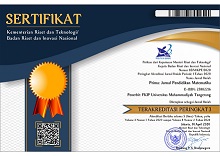DEVELOPING HOTS-BASED MATHEMATICS ASSESSMENT INSTRUMENTS TO IMPROVE CRITICAL THINKING SKILLS OF PROSPECTIVE ELEMENTARY SCHOOL TEACHERS
Abstract
The current reality is that most teachers have not developed their students' Higher Order Thinking (HOTS) skills. This is because the teachers themselves do not understand HOTS well. This research aims to develop HOTS-based mathematics assessment instruments for prospective elementary school teachers. The type and model of research conducted is research and development (R n D), Borg & Gall model. The product developed is a 10-item HOTS question. The questions that have been compiled are validated by three validators. Valid questions were tested on students who took Mathematics Learning courses. The trial was conducted with the aim of determining the quality of the instrument using classical test theory, namely validity, reliability, difficulty index, and distinguishing power. The results showed that the HOTS-based mathematics assessment instrument met the criteria of a quality instrument, namely very valid, high reliability, with good differentiation and difficulty levels. Thus, the instrument developed is suitable to be used to measure the HOTS ability of prospective teacher students. From the results of the test analysis, it was found that the students' ability to solve HOTS-based problems obtained an average of 74.65 was in the moderate category and the results of the analysis of students' critical thinking skills obtained 62.89% also in the moderate category. So it can be concluded that students' ability to solve HOTS-based questions is directly proportional to students' critical thinking skills. Thus, it can be concluded that HOTS-based assessment instruments can improve the critical thinking skills of prospective elementary school teachers.
Keywords
Full Text:
PDFReferences
Amrina, Z., Anwar, V. N., Alvino, J., & Sari, S. G. (2022). Analisis Technological Pedagogical Content Knowledge Terhadap Kemampuan Menyusun Perangkat Pembelajaran Matematika Daring Calon Guru SD. Jurnal Cendekia : Jurnal Pendidikan Matematika, 6(1), 1069–1079. https://doi.org/10.31004/cendekia.v6i1.1313
Amrina. Z. (2022) Evaluasi Pendidikan. Padang: LPPM Universitas Bung Hatta
Arief, R. (2012). Usaha Peningkatan Kompetensi Softskill Melalui Student Centered-Learning Bagi Mahasiswa Yang Mengikuti Mata Kuliah Analisa Perancangan Sistem. Jurnal Pendidikan Teknologi Dan Kejuruan, 21(1), 11–22. https://doi.org/10.21831/jptk.v21i1.3336
Arifin, Z. (2017). Mengembangkan Instrumen Pengukur Critical Thinking Skills Siswa pada Pembelajaran Matematika Abad 21. Jurnal THEOREMS (The Original Research of Mathematics), 1(2), 92–100. https://www.jurnal.unma.ac.id/index.php/th/article/view/383
Friyatmi, & Elvi Rahmi. (2020). Optimalisasi Keterampilan Guru Di Era Revolusi Industri 4.0 Melalui Pelatihan Asesmen Berbasis Higher Order Thinking Skills. Journal of Community Service, 2(2), 156–163. https://doi.org/10.56670/jcs.v2i2.45
Haryani, I. (2019). Analisis Langkah-langkah Penyelesaian Soal Matematika Tipe HOTS Bentuk Pilihan Ganda. Jurnal Pendidikan, 2(2), 79–94. https://core.ac.uk/download/pdf/267884779.pdf
Johson, E. B. (2010). Contextual Teaching & Learning, Menjadikan kegiatan Belajar- Mengajar Mengasyikkan dan Bermakna. Bandung: Kaifa.
Johansson, E. (2020). The Assessment of Higher-order Thinking Skills in Online EFL Courses: A Quantitative Content Analysis. NJES Nordic Journal of English Studies, 19(1), 224–256. https://doi.org/10.35360/njes.519
Kilicoglu, E., & Kaplan, A. (2022). Predicting the Mathematical Abstraction Processes Using the Revised Bloom’s Taxonomy: Secondary School 7th Graders. Athens Journal of Education, 9(2), 237–256. https://doi.org/10.30958/AJE.9-2-4
Misrom, N. S., Abdurrahman, M. S., Abdullah, A. H., Osman, S., Hamzah, M. H., & Fauzan, A. (2020). Enhancing students’ higher-order thinking skills (HOTS) through an inductive reasoning strategy using geogebra. International Journal of Emerging Technologies in Learning, 15(3), 156–179. https://doi.org/10.3991/ijet.v15i03.9839
Partono, P., Wardhani, H. N., Setyowati, N. I., Tsalitsa, A., & Putri, S. N. (2021). Strategi Meningkatkan Kompetensi 4C (Critical Thinking, Creativity, Communication, & Collaborative). Jurnal Penelitian Ilmu Pendidikan, 14(1), 41–52. https://doi.org/10.21831/jpipfip.v14i1.35810
Sugiyono. (2017). Metode Penelitian Pendidikan: Kuantitatif, Kualitatif, dan R&D. (Cetakan ke-25). Bandung: ALFABETA.
Widana, I. W. (2017). Modul Penyusunan Soal Higher Order Thinking Skill (HOTS). Jakarta: Direktorat Jenderal Pendidikan Dasar dan Menengah Departemen Pendidikan Dan Kebudayaan. Direktorat Jendral Pendidikan Dasar Dan Menengah.
Yusuf, I., Widyaningsih, S. W., Prasetyo, Z. K., & Istiyono, E. (2020). Higher order thinking skills (HOTS)-oriented e-module in electric circuit. Journal of Physics: Conference Series, 1521(2). https://doi.org/10.1088/1742-6596/1521/2/022027
Zubaidah, S. (2018). Mengenal 4C: Learning and Innovation Skills untuk Menghadapi Era Revolusi Industri 4.0. 2nd Science Education National Conference, October 2018, 1–18.
DOI: http://dx.doi.org/10.31000/prima.v8i1.9839
Article Metrics
Abstract - 878 PDF - 875Refbacks
- There are currently no refbacks.
Prima: Jurnal Pendidikan Matematika
Program Studi Pendidikan Matematika
Fakultas Keguruan dan Ilmu Pendidikan
Universitas Muhammadiyah Tangerang
Jl. Perintis Kemerdekaan I/33, Cikokol
Kota Tangerang, Indonesia
e-mail: primajpm@gmail.com
Prima: Jurnal Pendidikan Matematika (p-ISSN: 2579-9827 | e-ISSN: 2580-2216) is licensed under a Creative Commons Attribution 4.0 International License.







